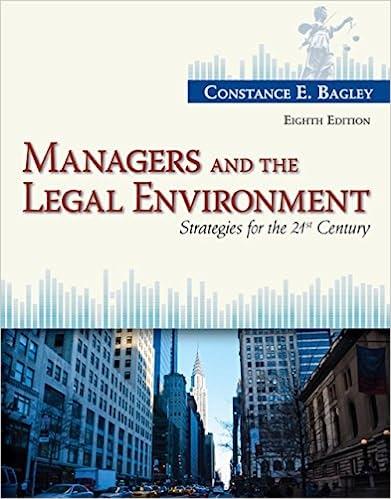A group of plaintiffs, including the American Civil Liberties Union, journalists, scholars, and lawyers, filed a lawsuit
Question:
A group of plaintiffs, including the American Civil Liberties Union, journalists, scholars, and lawyers, filed a lawsuit challenging the U.S. government's Terrorist Surveillance Program (TSP) as a violation of their constitutional rights and the Foreign Intelligence Surveillance Act of 1978 (FISA). In the wake of the September 11, 2001, terrorist attacks, President George W. Bush instituted the TSP, which empowered the National Security Agency (NSA) to intercept without a warrant any telephone and e-mail communication involving at least one party located outside the United States who the NSA has "a reasonable basis to conclude . . . is a member of al Qaeda, affiliated with al Qaeda, or a member of an organization affiliated with al Qaeda, or working in support of al Qaeda." The plaintiffs asserted that they communicated with persons living overseas who were the types of people targeted by the TSP and were therefore likely to have been subjected to the NSA's eavesdropping.
The district court granted summary judgment in the plaintiffs' favor and enjoined the NSA from utilizing the TSP. The court concluded that "three publicly acknowledged facts about the TSP-(1) it eavesdrops, (2) without warrants, (3) on international telephone and e-mail communications in which at least one of the parties is a suspected al Qaeda affiliate-were sufficient to establish standing" and constituted a violation of the Fourth Amendment to the U.S. Constitution. The NSA appealed on the grounds that the plaintiffs lacked standing because they could not prove that they personally had been injured by the program. The NSA invoked the state secrets doctrine to deny the plaintiffs access to the records of which conversations had been recorded in warrantless wiretaps. (The state secrets doctrine bans the discovery or admission of evidence that would "expose [confidential] matters which, in the interest of national security, should not be divulged."179) Do individuals have standing to challenge a warrantless international wiretapping program when they cannot prove that their conversations were intercepted? Should it matter that the defendant invoked privilege to make such information unavailable?
Step by Step Answer:

Managers And The Legal Environment Strategies For The 21st Century
ISBN: 9781285860374
8th Edition
Authors: Constance E. Bagley





